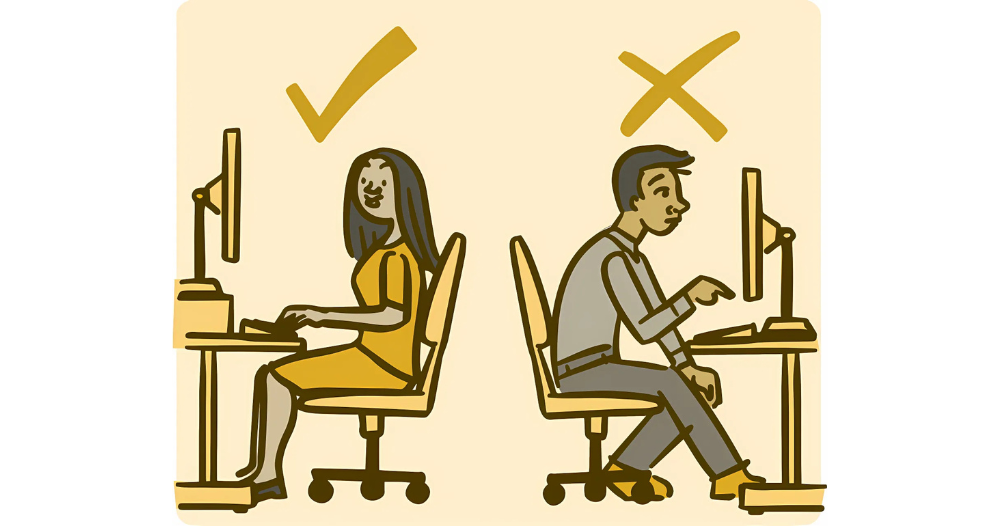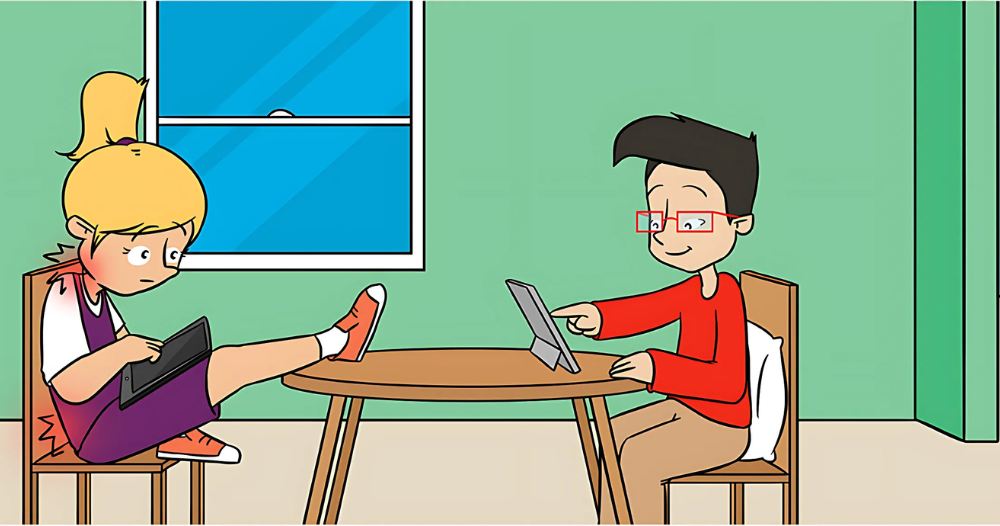Discover how hunched shoulders in communication can affect how you’re perceived, express emotions, and influence interactions. Learn the hidden messages behind body language and improve your non-verbal communication skills.
Table of Contents
Introduction
Ever been in a conversation with someone and felt like their body language was speaking louder than their words? You know, that feeling when you’re trying to get your point across, but someone’s hunched shoulders just seem to tell a different story. That subtle slouch, the rounded back – it’s not just bad posture; it’s a form of non-verbal communication that can either strengthen or sabotage your message.
We’re all aware of how important words are in communication, but what about the way we carry ourselves? Our body language can reveal our true emotions, intentions, and attitudes, sometimes even before we say a word. And believe it or not, hunched shoulders in communication are one of those telltale signs. They might suggest discomfort, insecurity, or a lack of confidence. So, how can we interpret this in others, and what does it say about us when we’re the ones slouching?
Let’s dive deeper into the world of body language and see how hunched shoulders in communication play a bigger role than you might think.
What Do Hunched Shoulders Really Mean?

At first glance, hunched shoulders may seem like nothing more than a posture issue. However, they can be a powerful form of communication. Body language experts argue that the way we hold our body can reveal much more than just physical fatigue. Hunched shoulders can signify a variety of emotions, from stress and discomfort to defensiveness or even guilt.
The Psychological Impact of Hunched Shoulders
When someone walks into a room with their shoulders hunched forward, it’s almost as if they’re physically withdrawing from the space. It’s as if they’re trying to make themselves smaller, less noticeable. This can happen for several reasons:
- Insecurity: If someone’s feeling unsure of themselves, their body may unconsciously reflect that by slouching or hunching.
- Lack of Confidence: A person might feel unworthy or intimidated, which can manifest as a lowered posture.
- Stress: When under pressure or stressed out, people tend to hunch their shoulders as a sign of mental and emotional tension.
- Defensiveness: Hunching may be a protective mechanism, subconsciously trying to shield oneself from perceived threats.
How Hunched Shoulders Can Affect Communication
When someone’s shoulders are hunched, it’s easy to misinterpret their message. You might assume they’re disinterested, closed off, or uncomfortable – and in some cases, you’d be right! Here’s how hunched shoulders in communication can play out in different settings:
- In a Business Meeting: A slouched posture might suggest a lack of enthusiasm or disengagement. It can also signal that the person feels overwhelmed or not confident in the topic at hand.
- During Social Interactions: If you’re chatting with someone and their shoulders are hunched, it could mean they’re feeling awkward or unsure of how to fit into the conversation.
- In Romantic Relationships: Hunched shoulders might indicate someone’s holding back emotionally or feeling vulnerable. It can signal hesitation in fully opening up.
How to Read Hunched Shoulders in Others

Understanding the subtle signals of hunched shoulders in communication is key to interpreting someone’s state of mind. Here’s what you should be on the lookout for:
Hunched Shoulders as a Sign of Anxiety
If you’re having a conversation with someone and their shoulders are rolled forward, they might be feeling anxious. It’s their body’s way of protecting them from discomfort, a kind of instinctual attempt to “curl up” when they’re nervous. In this case, the person might not necessarily be disinterested, but rather, they’re struggling to cope with the pressure of the moment.
Hunched Shoulders as a Sign of Submission
In some scenarios, hunched shoulders in communication might indicate submission. For example, in a hierarchical setting like the workplace, someone with hunched shoulders might be signalling that they feel inferior or less powerful compared to others. They might be hesitant to assert themselves or stand their ground, making them appear less dominant.
Hunched Shoulders in Conflict
Ever notice how people hunch their shoulders when they’re arguing or in the middle of a tense situation? This posture can be a defensive reaction. When we feel threatened, either physically or emotionally, our body might instinctively contract to protect itself. So, if someone’s shoulders are hunched during a disagreement, they may be closing themselves off from you, unwilling to engage openly.
What Happens When You Hunch Your Shoulders in Communication?

Now, what if it’s you who’s the one sporting hunched shoulders in communication? Whether it’s from stress, fatigue, or just a habit, it’s important to be mindful of the effect this posture can have on how others perceive you.
How Hunched Shoulders Can Make You Look Less Approachable
Imagine walking into a room full of people, your shoulders hunched, your gaze down, avoiding eye contact. Without saying a word, you’ve already sent a message: “I’m not open for conversation.” It’s like putting up a wall. People might read you as unfriendly, distant, or withdrawn.
- Improves First Impressions: If you’re trying to impress in an interview, slouching can give off the wrong vibe. Straightening up can make you look more confident and engaged.
- Impact on Friendships and Relationships: In personal interactions, hunched shoulders can be off-putting. People may find it hard to connect with you if they feel like you’re not giving them your full attention or energy.
The Hidden Health Impact of Hunched Shoulders
Of course, hunched shoulders in communication don’t just affect your image. Over time, poor posture can lead to physical problems like:
- Neck and back pain
- Reduced lung capacity due to compression of the chest
- Fatigue from muscle strain
Taking steps to correct your posture can improve your comfort, health, and communication at the same time!
How to Fix Hunched Shoulders in Communication

No one likes feeling self-conscious about their body language. Luckily, you can correct hunched shoulders in communication with a few simple adjustments.
1. Posture Awareness
The first step is becoming aware of your posture. Are you slouching while you work? Are you hunching when you talk to people? Once you notice, it’s easier to adjust.
2. Strengthen Your Back Muscles
The muscles in your upper back and shoulders are crucial for maintaining good posture. Strengthening them with exercises like:
- Rows
- Shoulder blade squeezes
- Lat pull-downs
can help you stand taller and avoid the hunched look.
3. Take Breaks and Stretch
If you spend a lot of time at a desk, taking regular breaks to stretch your back and chest muscles will keep you from slumping over.
4. Mind Your Breathing
Breathing deeply and standing tall can naturally correct your posture. When you’re hunched, you’re often not fully using your lungs. By consciously standing tall and taking deep breaths, you’ll create more space in your chest and improve your overall posture.
Conclusion
So, the next time you’re in a conversation or standing in a room, pay attention to how you’re holding your shoulders. Hunched shoulders in communication might be sending the wrong signals without you even realising it. Whether it’s insecurity, anxiety, or simply a bad habit, it’s important to be mindful of your body language. Correcting your posture not only improves how others perceive you, but it can also make you feel more confident, relaxed, and in control.
Start standing tall, and watch how your communication transforms. You’ll not only look more approachable, but you’ll also feel more confident and ready to take on the world – without any slouching!
Avoiding Eye Contact in Communication: The Hidden Signals We Miss
For Video Content: Checkout Our Youtube Channel
FAQs about Hunched Shoulders in Communication
Can hunched shoulders make me seem less confident?
Absolutely! Hunched shoulders can make you look less sure of yourself. Straightening up signals confidence and openness to others.
How do I know if someone is hunched because of stress?
Look for other signs like tense facial expressions, fidgeting, or avoiding eye contact. These can indicate someone is feeling stressed or anxious.
Can posture really affect the way people perceive me in interviews?
Yes, definitely! Good posture during an interview shows you’re engaged and confident. Hunched shoulders might make you look uninterested or nervous, which can hurt your chances.
By: Ardansharma


